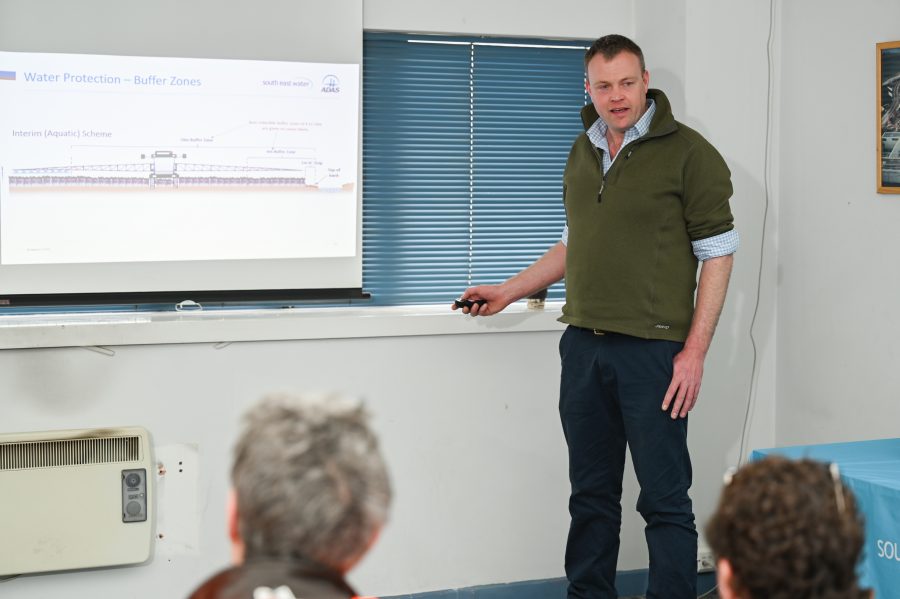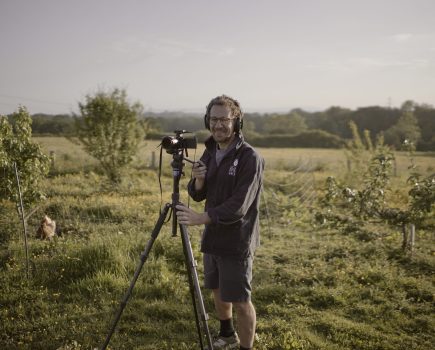At a recent South East Water farm event, ADAS consultant John Gadsby provided practical advice on how investing in infrastructure and updating management practices can protect water quality while supporting farm productivity.
Taking advantage of the different ways there are to protect water and the environment, many of which can be funded through private or government grants, can also boost farm efficiency.
That was the message from ADAS consultant John Gadsby as he outlined some of the most effective methods of improving quality that can be match-funded through South East Water and catchment sensitive farming capital grants schemes.
Infrastructure – pesticide handling
“Sprayer washdown and filling areas are one of the most effective ways of reducing the risk of pesticides reaching watercourses, especially when teamed with a biobed or biofilter for treatment of contaminated washings,” said Mr Gadsby.
He said roofed and outdoor areas helped capture spillages and contaminated washings, but added that it was important to choose the right treatment system for the site.
Mr Gadsby advised that those with a roofed area who were looking to use it mainly for filling and the occasional washdown should opt for a biofilter. Those with outdoor sites or a demand for regular washing were advised to choose a biobed.
Soil management
Mr Gadsby went on to encourage farmers to prioritise soil health. “It’s well documented that getting soils in good order helps productivity, but this comes with the bonus of reducing run-off and therefore less risk of pesticides, nitrates and bacteria reaching water,” he said.
“A good soil structure will improve farm resilience to extreme weather, with roots having better access to soil water in times of drought and better absorption in times of excessive rain.”
He said soil sampling and analysis was a good starting point to give farmers a benchmark and help decision making on improving their soil. This sampling can be funded by South East Water, after which cropping and cultivation options can also be funded to help improve soil health.
Mr Gadsby said digging soil pits could help farmers assess soil structure and health. “This knowledge will help you develop a cultivation strategy and inform the depth of remedial cultivation required – compaction isn’t always as deep as you might think,” he commented.
Integrated Pest Management
Another way of protecting water quality is by using integrated pest management (IPM), said Mr Gadsby.
“While many have already adopted some IPM principles, it’s important that as an industry, we make a switch in mindset when it comes to crop production, to focus on prevention rather than cure,” he added.
On developing an IPM plan, Mr Gadsby said: “I’d recommend looking at the range of IPM planning information sources available on the key weed, pest and disease issues on your farm and what techniques are appropriate for your system.
“Interventions should include wider rotational and planning elements, pre-establishment decisions and the selection of control methods within the growing crop.”
Mark Slater, South East Water catchment advisor, said it was imperative that the water company worked in partnership with land managers, offering bespoke advice that would best support their businesses and water quality.
“We’re therefore working with agricultural industry experts such as ADAS to provide advice alongside our capital grants acheme, to help facilitate more resilient, healthy water supplies,” he said.
For more advice or information about the availability of funding on these or other options, please speak to your South East Water catchment advisor or see
www.southeastwater.co.uk/grants.
For more like this, sign up for the FREE South East Farmer e-newsletter here and receive all the latest farming news, reviews and insight straight to your inbox.







